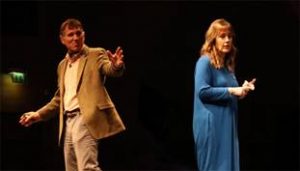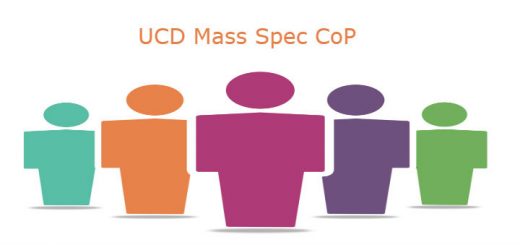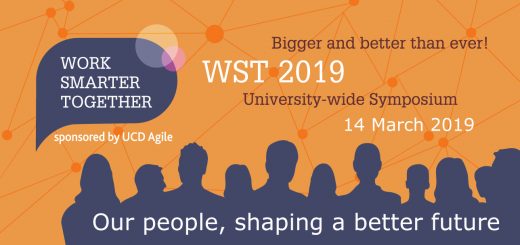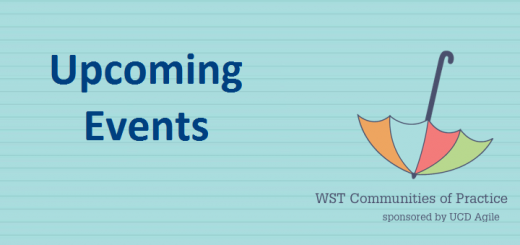WST 2019 survey analysis
By Michael Sinnott, Director of Agile
 We got a great response to the WST 2019 survey we ran the week after our March event. The infographic shows the high level stats, all of which very positive – the speakers, the format, the breakout sessions, the venue etc. We are glad that all they work put into creating the event, by so many colleagues from across the campus, paid off so well.
We got a great response to the WST 2019 survey we ran the week after our March event. The infographic shows the high level stats, all of which very positive – the speakers, the format, the breakout sessions, the venue etc. We are glad that all they work put into creating the event, by so many colleagues from across the campus, paid off so well.
Given the event is driven by celebrating collaboration and creativity and creating opportunities to network and connect, one of the event’s successes continues to be all the collaboration and creativity that go into making the event itself.
But enough of the self-congratulation! There was plenty in the survey responses to feed into planning for the next WST main event and, as in 2017, this will be used in the lessons learned and guidance for the next event.
 One of the areas mentioned was the keynotes. We know Manley Hopkinson went down well but some questioned his relevance in a third level institution. WST is about collaboration and creativity – his input, beyond the inspiration itself, was about how we can be better together than as individuals, how teams shape success, what it is to be a leader etc., fitting in neatly with WST. Aine McCleary was chosen not because she came from a banking background but because she is a successful woman, a strong voice, a clear leader, with experience of change in a large organisation, change which learned from its experience and changed how it was doing change. Someone did point out the sequence of David Putnam, David White and Manley Hopkinson over the three WSTs to date so the next event may well look to a different approach.
One of the areas mentioned was the keynotes. We know Manley Hopkinson went down well but some questioned his relevance in a third level institution. WST is about collaboration and creativity – his input, beyond the inspiration itself, was about how we can be better together than as individuals, how teams shape success, what it is to be a leader etc., fitting in neatly with WST. Aine McCleary was chosen not because she came from a banking background but because she is a successful woman, a strong voice, a clear leader, with experience of change in a large organisation, change which learned from its experience and changed how it was doing change. Someone did point out the sequence of David Putnam, David White and Manley Hopkinson over the three WSTs to date so the next event may well look to a different approach.
One of the challenges highlighted in the survey was attendance. The challenge for some in taking a full day for the event was raised, as were last minute business demands keeping people away, outlining a desire for an alternative to full day only registration. This will be taken on board but it is important to note that the intention in WST is to create a full day event that draws colleagues away from their day to day environment and brings them together of a mixture of different kinds of inputs, opportunities to meet and mix. For those of us who have been to conferences outside UCD, it is the stepping back and away which can be so valuable.
 The importance of senior management support and attendance was raised in some comments. It is through the long-standing support of Mark Rogers that these events take place and his commitment has been a consistent support dating back to the first precursor to WST in 2011. Broader engagement at management level, and in some of the major unfits, is an interesting point to raise and this will be a key element of the lead in to the next event. As a comment, the question that always occurs to me in this context is to wonder where folks are placing their focus and how folks are motivated by what they see as valuable. WST is about the support ecosystem which make the education and research in UCD possible, and the collaboration and creativity which supports and develops this ecosystem, with this ecosystem in UCD working quite well, broadly speaking. This “it works” analysis does not necessarily lead to curiosity nor does it look to focus motivation or how we measure our sense of achievement because… it works. How does ‘it’ work? How do we make ‘it’ better and ‘better’ easier?
The importance of senior management support and attendance was raised in some comments. It is through the long-standing support of Mark Rogers that these events take place and his commitment has been a consistent support dating back to the first precursor to WST in 2011. Broader engagement at management level, and in some of the major unfits, is an interesting point to raise and this will be a key element of the lead in to the next event. As a comment, the question that always occurs to me in this context is to wonder where folks are placing their focus and how folks are motivated by what they see as valuable. WST is about the support ecosystem which make the education and research in UCD possible, and the collaboration and creativity which supports and develops this ecosystem, with this ecosystem in UCD working quite well, broadly speaking. This “it works” analysis does not necessarily lead to curiosity nor does it look to focus motivation or how we measure our sense of achievement because… it works. How does ‘it’ work? How do we make ‘it’ better and ‘better’ easier?
 Another area of note was the breakout sessions. We took the feedback from WST 2017 and changed how we approached the sessions in 2019, reducing the number and looking more coherent – they were somewhat
Another area of note was the breakout sessions. We took the feedback from WST 2017 and changed how we approached the sessions in 2019, reducing the number and looking more coherent – they were somewhat  fragmented in 2017 – with more opportunity for audience involvement. This worked very well in some cases. What we learned in preparing the event was just how much work is required to help a one hour session with a number of strands come together to create a good sessions, with great commitment, time and energy from the folks involved. In truth, it was fun to try to make this work, and great to be involved in all the interplay needed in the lead in.
fragmented in 2017 – with more opportunity for audience involvement. This worked very well in some cases. What we learned in preparing the event was just how much work is required to help a one hour session with a number of strands come together to create a good sessions, with great commitment, time and energy from the folks involved. In truth, it was fun to try to make this work, and great to be involved in all the interplay needed in the lead in.
 And lastly the posters. There was lots of great content (click here to see the full gallery), put together and displayed with sophistication and professionalism, reflecting some of the very impressive work going on across the campus. For those with a memory for previous WSTs, you have seen a marked evolution of what was on display – both in terms of the work which gave rise to the content and in the posters themselves. Huge credit is due to those involved and to all of the support and help they can access, both in the work behind the posters and in bringing the posters to light.
And lastly the posters. There was lots of great content (click here to see the full gallery), put together and displayed with sophistication and professionalism, reflecting some of the very impressive work going on across the campus. For those with a memory for previous WSTs, you have seen a marked evolution of what was on display – both in terms of the work which gave rise to the content and in the posters themselves. Huge credit is due to those involved and to all of the support and help they can access, both in the work behind the posters and in bringing the posters to light.
Many thanks for the survey response. It is both a very positive feedback to those who presented, who produced the posters, to developed the various sessions and who made the venue work so well, and it will shape what we do at further events.
Michael Sinnott
On behalf of the Event Planning Group
Andrew Myler (Registry), Caroline McTeigue (Registry), Ciaran Bennet (Estates), Santiago Astorga (Estates), Dipti Pandya (Research Administration), Jason Masterson (Student Services), Andy Taylor (Student Centre), Lorna Bailey (Student Centre), Michael Sinnott (UCD Agile), Helen Kenny (School of Economics), Olga Murdoch (UCD Agile), Mark Simpson (Human Resources), Paul Fitzgerald (Human Resources), Marie Burke (Library), Allan Maguire (Finance Office), Paul Barry (IT Services), Michelle Latimer (Library), Monika Chorchos (Student Centre).



